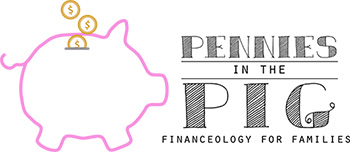Highlights
- Money is a tool to reach goals that you’ve already chosen
- Financial decisions have to be tied to your goals
- Try to recognize your own issues and help your children see them too. So that they can do better.

Relationships. It’s a loaded word. Some relationships are healthy. Some aren’t. It may be fairly simple to identify factors of healthy interpersonal relationships: that person is supportive, that person makes everyone feel like a million bucks. What may be less obvious is identifying what kind of relationships we have to things, and whether they are “healthy” or not. But whether dealing with people or things, often we are blind to our own follies and those things and people we care most about. How healthy are my relationships? The discovery of how healthy our relationships are can be difficult, but also liberating in many ways. And perhaps, determining the health of our relationship with money (as this is a financial blog) may be one of the most liberating moments of all. Healthy relationships with money see money as a tool and nothing else. Not a motivator. Not a ball and chain. Not even a goal. Simply a tool. Wrapping your mind around this concept will ultimately lead to greater financial health.

Let’s talk for a minute about what else money is not: money is not a crutch; money is not evil (if you want to get Biblical, the lust for money is evil, money itself is neutral); money is not unfriendly; money is not unknowable. Money is a tool; and all discussions about money must being with long-term aspirations and dreams, followed by short-term steps or goals to achieve those dreams, followed by actionable and measurable steps to reach those short-term goals, followed by budgeting and how income and expenditures fall into the mix.
Now that we have a baseline to understand money as a neutral tool, let’s try to better define how people personally relate to money. There are a lot of individuals, which means there are a lot of different relationships to money, but perhaps narrowing down the scope to a few descriptive types can better help us identify our own weaknesses and improve our financial health. Here are some less than optimal relationship descriptions:
- The Agnostic – This person doesn’t understand how money works and is afraid to learn more. Ignorance is not the issue; ignorance is a relatively easy fix. It’s the fear and unwillingness to learn more that trip up The Agnostic. They end up spending money when it’s there, not planning too far ahead, and never checking their bank account because they’re afraid the balance will be low. A worse manifestation of much the same issue is the one who constantly reads self-help books but always says he’ll change later.
- The Daydreamer – This guy has a lot of the dreams and aspirations but doesn’t do any of the intermediary planning. Long-term goals require short-term steps to achieve. This guy skips the steps completely and tries to jump straight to the long-term goal. This often ends with falling short… and usually on one’s face. They go into massive debt to pay for a huge house or a great car and end up paying way more for it than their friend who planned and saved. Or this could manifest as the person who is a complete “failure to launch” with big plans and no action.
- The Addict – This person spends money to try and make themselves happy. They spend money now meeting immediate desires. All they do is live paycheck-to-paycheck—not because they don’t have enough money, but because they don’t have any goals.
- The Pauper – The Pauper sees money as unattainable. They don’t have money and never can have it. They miss out on opportunities because they’re afraid to take a chance or simply afraid to change their behavior.
I’m sure most of us relate to at least one of these bad habits. It may not be perpetual, but we all fall into these traps occasionally. How do we end up with these bad habits? Money behavior is learned. A big part of the way we treat money is learned from our parents, learned from friends, and learned from experience, such as when we’re first on our own away from our parents. The point is that relationships to money are learned and they can be unlearned.
To change our relationship to money we need a plan.

- Education. Some suggestions on the internet are good and some are bad so look for good suggestions that are coming from separate, reputable sources. Learn the basics first, then fill in the gaps with knowledge of other things. Don’t be afraid to change based on your new education. And don’t think that change will be automatic. Remember—small steps.
- Start a conversation about your long-term dreams. Break those dreams into steps. Budget out what it will take to achieve those steps and think outside the box if you need to.
- This next one is hard. If you are friends with people that are in the way of you and those goals, then cut them loose. If there is a group of people who you hang with after work and you throw money away when you’re with them, then they are between you and your goal. So, ask what is important to you and do that!
- Try practicing on a small scale. Improve a little at a time. Maybe save a little or just in one way (like eating out less every month).
- This is the big one. GRAB A COACH. The top Olympians in the world know how to run, jump, and swim, but they always have a coach, because a coach watches you, keeps you honest, and points out things you don’t see. A coach could be a friend or family member with a better relationship than you. A coach could be a friend who wants to improve WITH you. A coach can also be a professional, someone who has done this before and can help you make plans to improve your relationships to money.
Change can happen. Usually not quickly, and definitely not overnight. On a personal level, my (Julian) own malady is that of an addict. Instead of planning out and achieving things, I hoarded money and then would spend loads of it when I felt bad. I would go out to eat and buy things hoping to feel better. I didn’t spend money I didn’t have (luckily), but I didn’t achieve anything. I suffered through that for most of college. Then I met people (Michelle) that had learned better behavior. They saved and spent money with lots of goal-setting involved. They planned and prepared. Learning from them, I was able to pay off school debt and start investing faster than you might think possible. I saw a better way, and I learned, and I changed. Go do the same.

